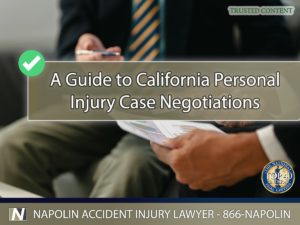A Guide to California Personal Injury Case Negotiations
Navigating personal injury cases in California requires a deep understanding of state-specific laws and regulations. These cases often involve intricate legal nuances that can significantly impact the outcome for injury victims. This guide aims to provide a thorough overview of the key aspects of personal injury case negotiations in California, offering valuable insights for those seeking justice and fair compensation.
Understanding Personal Injury Claims in California
Personal injury law in California encompasses a variety of cases, including auto accidents, slip and fall incidents, and workplace injuries. In these cases, the injured party must prove that the other party was negligent and that this negligence caused their injury. California follows a “pure comparative negligence” rule, meaning that compensation can be awarded even if the injured party is partially at fault, with the award reduced by their percentage of fault.

Key Factors Influencing Personal Injury Compensation
Key Factors Influencing Personal Injury Compensation
Several factors influence compensation in personal injury cases. These include the severity of the injury, the impact on the victim's lifestyle and ability to work, and the clarity of fault or negligence. In California, there are two main types of compensatory damages: economic damages for financial losses like medical bills and lost wages, and non-economic damages for pain, suffering, and emotional distress.
Effective Negotiation Strategies for Maximizing Compensation
Effective negotiation in personal injury cases involves a strategic approach to presenting evidence and understanding the tactics of insurance companies. Gathering detailed medical records, eyewitness statements, and expert testimonies is crucial. Additionally, demonstrating a clear understanding of the law and the ability to articulate the full impact of the injury on the victim's life can significantly strengthen the negotiation position.

The Role of a Personal Injury Lawyer in Negotiation
The Role of a Personal Injury Lawyer in Negotiation
A skilled personal injury lawyer is instrumental in navigating the complexities of California's legal system. They bring expertise in legal procedures, evidence gathering, and negotiation tactics. Lawyers can effectively communicate with insurance companies and opposing counsel, ensuring that the victim's rights are protected and their case is presented compellingly.
Navigating Settlement Offers
Evaluating settlement offers requires a careful balance of legal knowledge and strategic decision-making. It's important to assess the fairness of the offer in light of the damages suffered and the potential outcome of a trial. A lawyer can provide invaluable guidance in this process, helping to determine whether to accept the offer or continue negotiations.
The Litigation Process: What to Expect
If a settlement cannot be reached, the case may proceed to trial. The litigation process in California involves several stages, including filing a complaint, discovery, pre-trial motions, and the trial itself. Understanding these stages and preparing adequately can influence the negotiation process and lead to a more favorable outcome.

A Guide to California Personal Injury Case Negotiations
A Guide to California Personal Injury Case Negotiations
Understanding the intricacies of personal injury case negotiations in California is crucial for anyone seeking fair compensation for their injuries. If you're facing such a situation, consider reaching out to Napolin Accident Injury Lawyer at (866)-NAPOLIN for a free consultation. Our team's extensive litigation experience and deep understanding of California law make us well-equipped to represent your interests and secure the compensation you rightfully deserve.
- Safely and Legally Navigating Parking Lots in California - July 15, 2024
- Navigating the Aftermath of a Highway Auto Accident in California - July 15, 2024
- An Overview of California's Commercial Truck Insurance Laws - July 15, 2024
